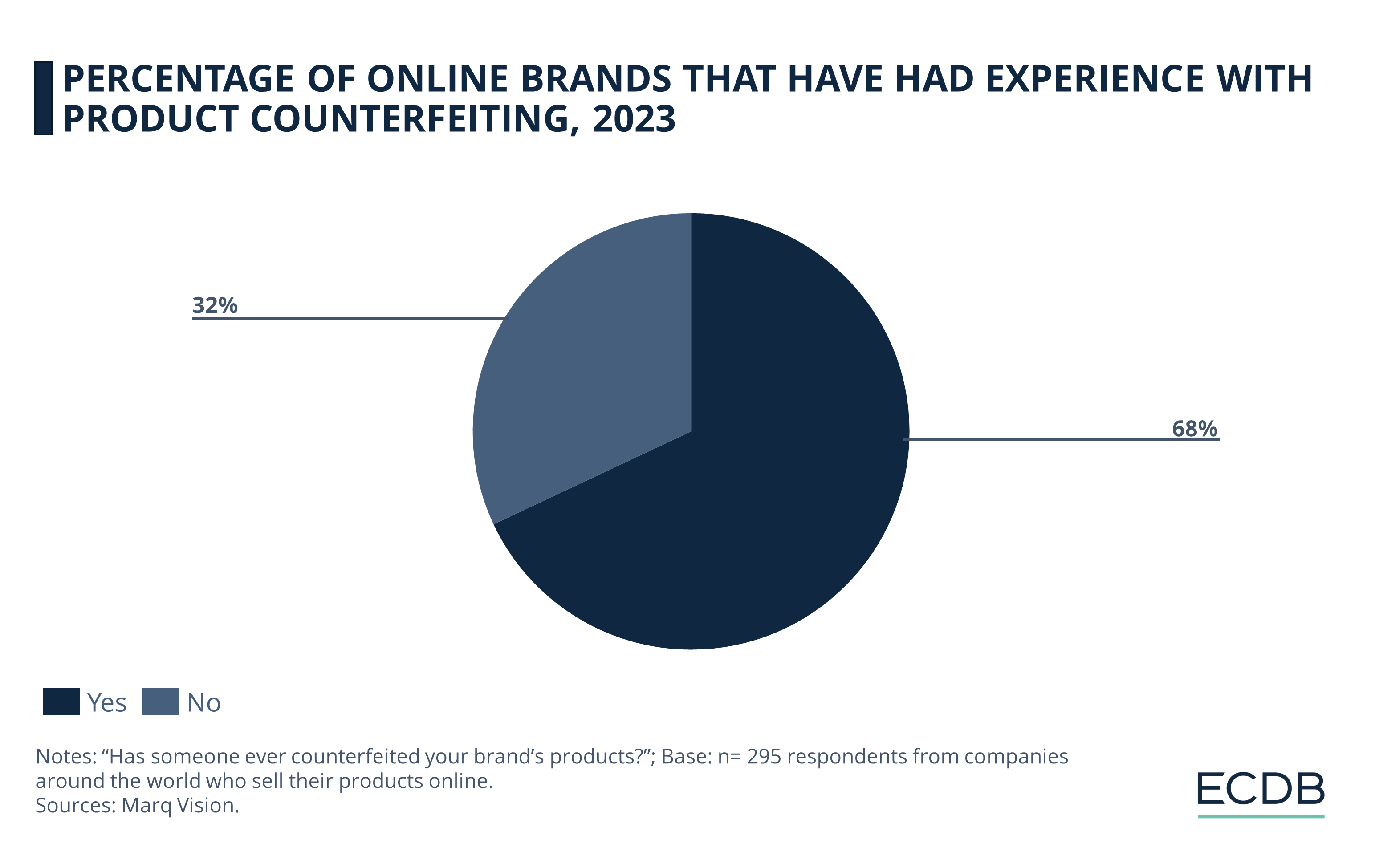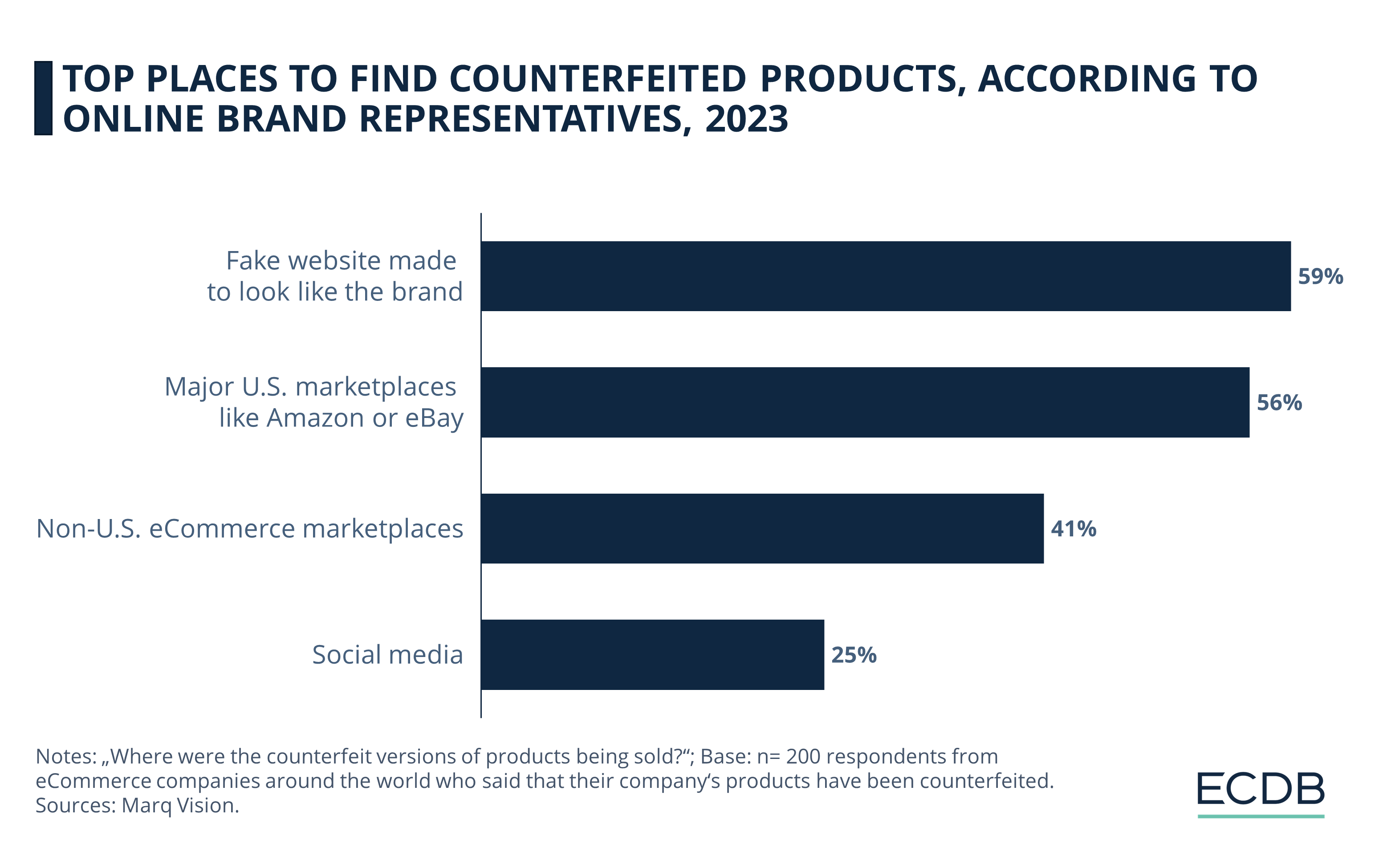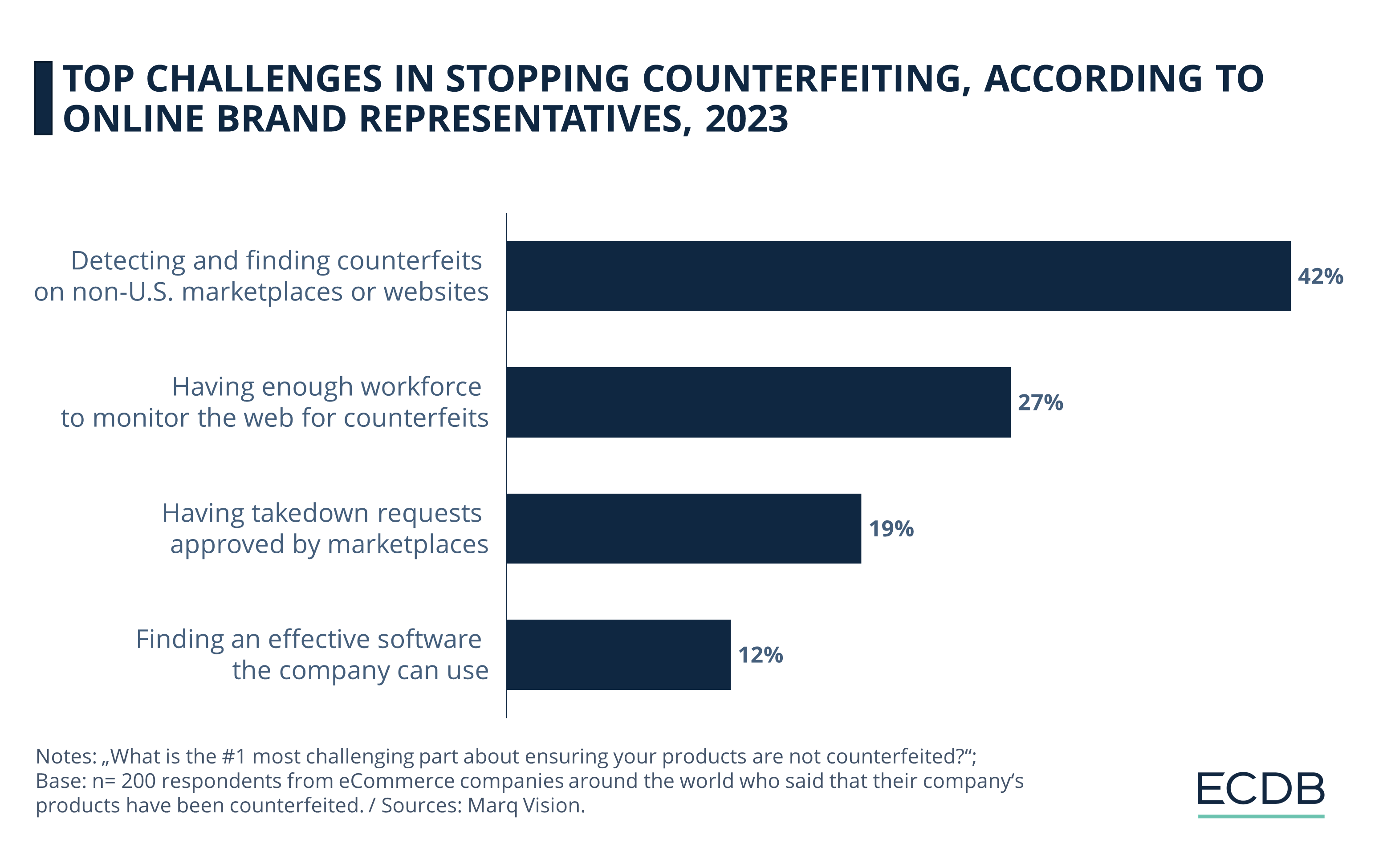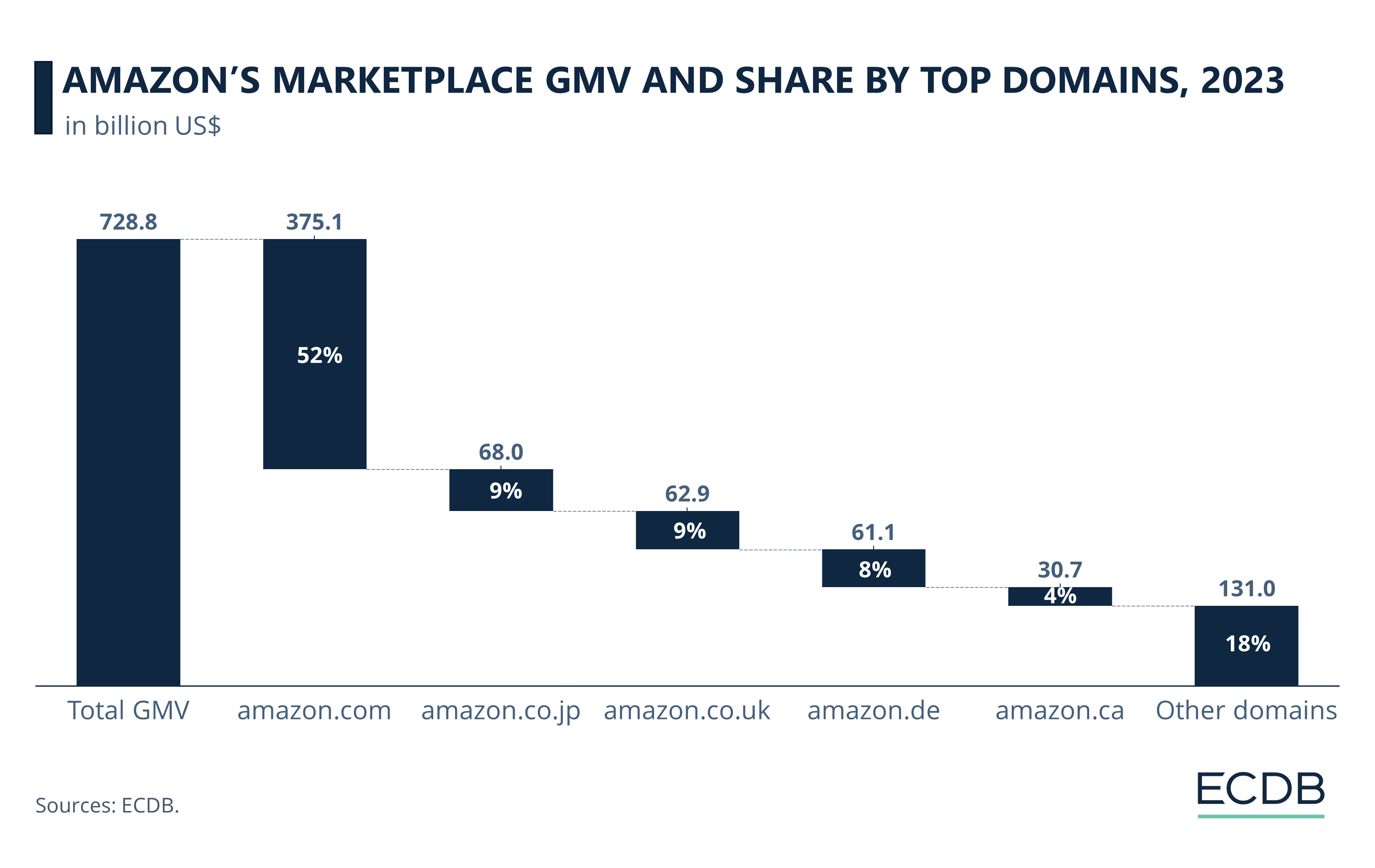eCommerce: Key Marketplaces
Amazon Counterfeit Products: What Online Brands Say & Why the U.S. Government Is Involved
Amazon and other major marketplaces have a problem with product counterfeiting: Selling fakes can not only hurt company revenues, but also damage brand reputation and even endanger consumers. While the rise of low-cost platforms like Shein and Temu certainly has a significant impact, Amazon is currently being investigated by the U.S. Consumer Product Safety Commission.
Article by Nadine Koutsou-Wehling | June 27, 2024Download
Coming soon
Share

Counterfeits in eCommerce: Key Insights
Counterfeiting Is Common: In 2023, almost 70% of eCommerce company representatives in a Marq Vision survey said they have had experience with product counterfeiting. Most commonly, fake websites made to look like the brand's and large U.S. marketplaces are used to sell fakes.
Challenges Encountered by Retailers: Detecting counterfeits on non-U.S. marketplaces is the biggest obstacle, followed by finding the necessary resources and personnel to scour the web for dupes.
Amazon Is Under Investigation: The U.S. Consumer Product Safety Commission is currently investigating whether Amazon should be held liable for harm (including copyright infringement) caused by third-party products sold on its marketplace.
As online marketplaces thrive, so do ingenuine sellers offering counterfeit products at much lower prices than the original.
For shoppers, this does not always seem a bad thing: A study by the Center for Anti-Counterfeiting and Product Protection at the Michigan State University found out that 52% of global consumers have intentionally purchased counterfeit products in the past year, while 68% have done so accidentally.
But authentic brands and sellers, especially small enterprises, encounter lost revenue and damage to their reputation due to counterfeiting. Consumers are also at risk of health and life threats from substandard products.
See how eCommerce brands encounter counterfeiting, and why Amazon is under investigation by the U.S. Consumer Product Safety Commission.
Almost 70% of eCommerce Brands Have Encountered Counterfeiting
A 2023 report by Marq Vision asked 295 eCommerce company representatives if their organization had encountered counterfeit products. A majority of 68% agreed.

Of those who responded that their products had been counterfeited, Marq Vision asked about the most common places the counterfeits were sold.

The number one answer was fake websites designed to look like the brand:
59% of online brand advocates have had experience with counterfeit websites. Consumers either receive inferior products after ordering from these sites, or the products are never shipped.
The second most common answer, just behind the first, is large U.S. marketplaces such as eBay or Amazon, at 56%.
Marketplaces outside the U.S. were a close second at 41%.
Social media was mentioned less frequently, with 25%.
This may be due to the lower relevance of social commerce in general, as well as the difficulty for brands to identify counterfeits on social media due to the sheer volume of posts.
A recent post by ModernRetail details the case of Cassey Ho, founder of fitness brand and activewear line Popflex, who faced a flood of counterfeits after Taylor Swift wore her workout “skort” (mix of skirt and short) in a short video. The avalanche of knockoffs following that post was too much for Ho to handle. Additionally, counterfeiters used AI to distort Ho’s promotional post about the product to the point of disqualifying claims of copyright infringement.
Finding Counterfeits on Non-U.S. Marketplaces Most Challenging
The challenges encountered by the Popflex founder are certainly not uncommon: Marq Vision’s report asked online brand representatives about the problems they face in preventing counterfeiting:

42% of representatives said that finding counterfeits on non-U.S. marketplaces is a challenge.
This is followed by 27% of respondents who lack the manpower to find counterfeits, and
19% who find the dupes but face uncooperative marketplace providers.
Lastly, 12% struggle to find effective software to automate finding counterfeits.
Should Amazon Be Liable for Harm Caused by Its Third-Party Products?
While low-cost platforms like Temu and Shein certainly contribute to the surge of counterfeits, Amazon Marketplace has been a hub for copycat products for years.
Despite efforts to combat counterfeiting, the sheer volume of inauthentic products is too much to handle, even for a seasoned behemoth like Amazon. With the billions of U.S. dollars that Amazon's marketplace generates annually, equivalent to the GDP of a high-income economy like Belgium, the company cannot inspect every product offered on the platform.

This is a double-edged sword: On the one hand, Amazon's retail business and its marketplace offering are closely intertwined, making it difficult for the average user to distinguish between first-party and third-party products. On the other hand, Amazon has its safeguards in place, including automated checks through AI, proof of identity for sellers, and customer reporting tools. Still, the sheer volume of product listings makes it nearly impossible to ensure the authenticity and quality of each one.
However, Amazon has been known to evade liability for damages caused by inferior products sold through its marketplace. This is clearly to protect its reputation and prevent losses from increased litigation and lawsuits.
Currently, there is an ongoing investigation by the U.S. Consumer Product Safety Commission to determine whether Amazon should be held accountable for the distribution of third-party products through its platform. Both sides have strong arguments, so it remains to be seen how the agency will rule.

Counterfeiting on Marketplaces: Wrap-Up
Counterfeiting, while not exclusive to eCommerce but facilitated by it, is a real problem for original brands. This is especially the case for smaller businesses that don't have the resources and/or manpower to combat counterfeit listings of their products.
Consumers do not always see the problem with counterfeiting, as it allows them to obtain products at a much lower price. But counterfeiting has caused significant harm, including cases that have ended in death.
The current investigation into Amazon's liability for third-party products illustrates how difficult it is to determine who is at fault when harm occurs. Add to this the emergence of marketplaces like Shein and Temu, whose business models rely on the low cost of counterfeit products, and it is clear that this issue will only grow in importance in the coming years.
Sources: CPSC – Marq Vision – Modern Retail – Seattle Times – WSJ

Click here for
more relevant insights from
our partner Mastercard.
Related insights
Deep Dive
eCommerce in Canada: Top Stores, Market Development & Trends
eCommerce in Canada: Top Stores, Market Development & Trends
Deep Dive
Top eCommerce Companies by Market Cap 2024
Top eCommerce Companies by Market Cap 2024
Deep Dive
Online Shopping in the United States: Where Consumers Prefer to Shop Online
Online Shopping in the United States: Where Consumers Prefer to Shop Online
Deep Dive
Alibaba Competitors: Which Companies Are Alibaba’s Biggest eCommerce Rivals?
Alibaba Competitors: Which Companies Are Alibaba’s Biggest eCommerce Rivals?
Deep Dive
The Global B2B eCommerce Market: Why It Is Beneficial to Sell to Other Businesses
The Global B2B eCommerce Market: Why It Is Beneficial to Sell to Other Businesses
Back to main topics